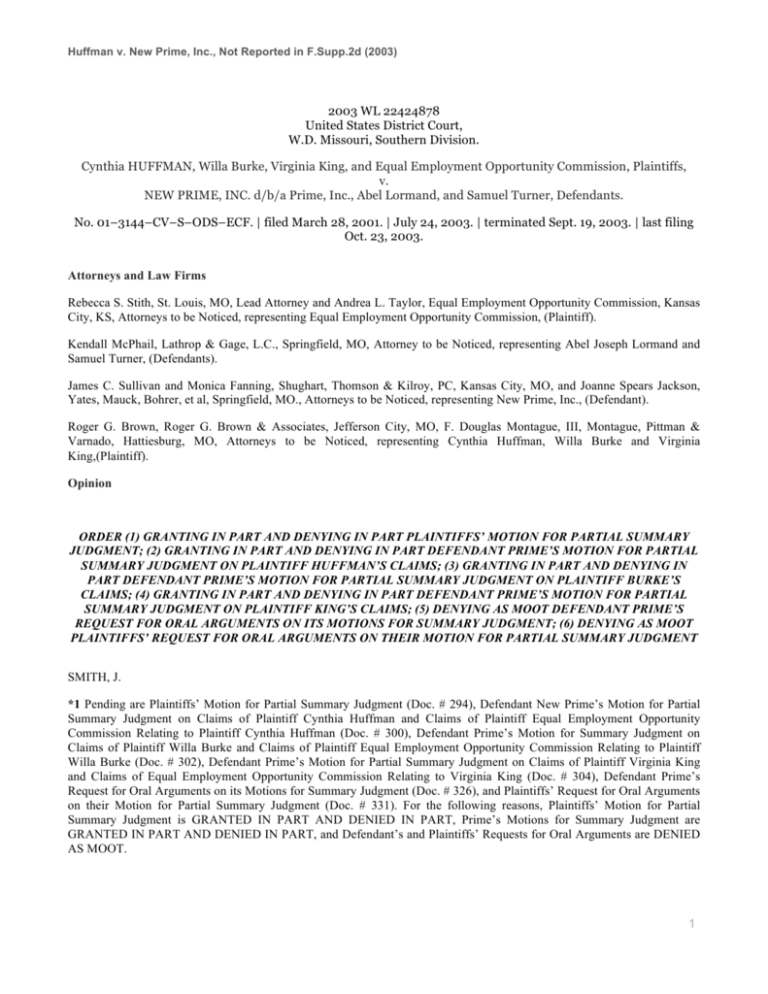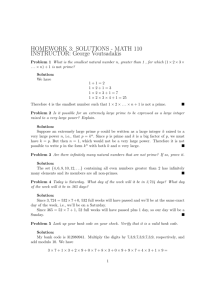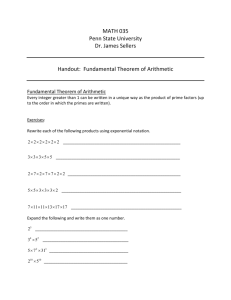
Huffman v. New Prime, Inc., Not Reported in F.Supp.2d (2003)
2003 WL 22424878
United States District Court,
W.D. Missouri, Southern Division.
Cynthia HUFFMAN, Willa Burke, Virginia King, and Equal Employment Opportunity Commission, Plaintiffs,
v.
NEW PRIME, INC. d/b/a Prime, Inc., Abel Lormand, and Samuel Turner, Defendants.
No. 01–3144–CV–S–ODS–ECF. | filed March 28, 2001. | July 24, 2003. | terminated Sept. 19, 2003. | last filing
Oct. 23, 2003.
Attorneys and Law Firms
Rebecca S. Stith, St. Louis, MO, Lead Attorney and Andrea L. Taylor, Equal Employment Opportunity Commission, Kansas
City, KS, Attorneys to be Noticed, representing Equal Employment Opportunity Commission, (Plaintiff).
Kendall McPhail, Lathrop & Gage, L.C., Springfield, MO, Attorney to be Noticed, representing Abel Joseph Lormand and
Samuel Turner, (Defendants).
James C. Sullivan and Monica Fanning, Shughart, Thomson & Kilroy, PC, Kansas City, MO, and Joanne Spears Jackson,
Yates, Mauck, Bohrer, et al, Springfield, MO., Attorneys to be Noticed, representing New Prime, Inc., (Defendant).
Roger G. Brown, Roger G. Brown & Associates, Jefferson City, MO, F. Douglas Montague, III, Montague, Pittman &
Varnado, Hattiesburg, MO, Attorneys to be Noticed, representing Cynthia Huffman, Willa Burke and Virginia
King,(Plaintiff).
Opinion
ORDER (1) GRANTING IN PART AND DENYING IN PART PLAINTIFFS’ MOTION FOR PARTIAL SUMMARY
JUDGMENT; (2) GRANTING IN PART AND DENYING IN PART DEFENDANT PRIME’S MOTION FOR PARTIAL
SUMMARY JUDGMENT ON PLAINTIFF HUFFMAN’S CLAIMS; (3) GRANTING IN PART AND DENYING IN
PART DEFENDANT PRIME’S MOTION FOR PARTIAL SUMMARY JUDGMENT ON PLAINTIFF BURKE’S
CLAIMS; (4) GRANTING IN PART AND DENYING IN PART DEFENDANT PRIME’S MOTION FOR PARTIAL
SUMMARY JUDGMENT ON PLAINTIFF KING’S CLAIMS; (5) DENYING AS MOOT DEFENDANT PRIME’S
REQUEST FOR ORAL ARGUMENTS ON ITS MOTIONS FOR SUMMARY JUDGMENT; (6) DENYING AS MOOT
PLAINTIFFS’ REQUEST FOR ORAL ARGUMENTS ON THEIR MOTION FOR PARTIAL SUMMARY JUDGMENT
SMITH, J.
*1 Pending are Plaintiffs’ Motion for Partial Summary Judgment (Doc. # 294), Defendant New Prime’s Motion for Partial
Summary Judgment on Claims of Plaintiff Cynthia Huffman and Claims of Plaintiff Equal Employment Opportunity
Commission Relating to Plaintiff Cynthia Huffman (Doc. # 300), Defendant Prime’s Motion for Summary Judgment on
Claims of Plaintiff Willa Burke and Claims of Plaintiff Equal Employment Opportunity Commission Relating to Plaintiff
Willa Burke (Doc. # 302), Defendant Prime’s Motion for Partial Summary Judgment on Claims of Plaintiff Virginia King
and Claims of Equal Employment Opportunity Commission Relating to Virginia King (Doc. # 304), Defendant Prime’s
Request for Oral Arguments on its Motions for Summary Judgment (Doc. # 326), and Plaintiffs’ Request for Oral Arguments
on their Motion for Partial Summary Judgment (Doc. # 331). For the following reasons, Plaintiffs’ Motion for Partial
Summary Judgment is GRANTED IN PART AND DENIED IN PART, Prime’s Motions for Summary Judgment are
GRANTED IN PART AND DENIED IN PART, and Defendant’s and Plaintiffs’ Requests for Oral Arguments are DENIED
AS MOOT.
1
Huffman v. New Prime, Inc., Not Reported in F.Supp.2d (2003)
I. BACKGROUND
Plaintiffs Cynthia Huffman (“Huffman”), Willa Burke (“Burke”) and Virginia King (“King”) were all employed by
Defendant New Prime (“Prime”). Abel Lormand (“Lormand”), Samuel Turner (“Turner”) and Kenneth Littlejohn
(“Littlejohn”)1 were lease-operator drivers2 who leased a tractor unit from Success Leasing, a Prime company, then leased the
tractor unit back to Prime. Lormand, Turner and Littlejohn entered into Independent Contractor Operating Agreements with
Prime, which provided that “[t]he parties intend to create by this agreement the relationship of Carrier and Independent
Contractor and not an employer/employee relationship.” Under the lease contract, the lease-operators could only drive loads
for Prime. Prime or the lease-operator could terminate the lease in accordance with the terms set forth in the Independent
Contractor Operating Agreement.
Lease-operators were paid on a gross per mile basis; Lormand, Turner and Littlejohn were paid 72% of the line haul revenue
for the freight transported with a minimum of eighty cents per dispatched mile. They were paid on a weekly basis with Prime
deducting the cost of the lease of the trailer from their compensation. Prime reported the lease-operator’s gross income to the
Internal Revenue Service on a Form 1099.
Lease-operators were responsible for their own withholding taxes and were required to obtain insurance. A lease-operator had
to pay the $500 insurance deductible for damage to customers’ cargo or Prime’s trailers. They were also responsible for their
own expenses, such as fuel, fuel taxes, tolls, ferries, maintenance, repairs, and costs associated with loading and unloading
the trailers. They were required to receive permission to have passengers ride along with them, submit to random drug tests,
and wash the trailer. Prime made health insurance available to lease-operators, but Prime did not pay any portion of the
lease-operator’s insurance premium.
*2 Loads were assigned to the lease-operators by Prime’s Fleet Managers, also known as Dispatchers, who also supervised
the lease-operators and answered questions lease-operators had in carrying out their responsibilities. Lease-operators were
free to accept or deny loads, decide what days of the week and hours they wish to work, and take vacation and time off
whenever desired. Lease-operators could choose the route to make their delivery; however, if the route chosen by the
lease-operator was longer than Prime’s computer system allowed, the lease-operator received payment according to the
shorter route articulated in Prime’s computer system.
Lease-operators could increase their mileage, and, thus, their revenue, by engaging a “second seat” driver. A second seat
driver was a licensed eighteen-wheel tractor-trailer driver who accompanied the lease-operator and drove the lease-operator’s
tractor, thereby increasing the number of miles driven without violating federal and state “hours of service” regulations. In
order to have a second seat driver assigned to a lease-operator’s tractor, Prime had to approve the assignment.
Lease-operators were permitted to use Prime’s driver-trainees (“trainees”) as second seat drivers. Lease-operators paid the
second seat driver’s salary and worker’s compensation insurance, regardless of whether the second seat driver was a trainee
or not. Trainees received W–2 forms from Prime that identified Prime as the trainee’s employer,3 and Prime determined the
trainee’s rate of pay.
Beginning in 1997, Prime began an orientation seminar called Training the Trainer (“TnT”) to instruct truck drivers who
were willing to train new drivers. Trainers were expected to instruct the trainees in accordance with Prime’s training
schedule, which encompassed a six-week progression of developing the necessary skills to operate a truck. The trainer was
expected to give the trainee feedback regarding the trainee’s performance during training. Additionally, Fleet Managers could
take into consideration a trainer’s evaluation of a trainee’s progress when deciding whether to upgrade a trainee.
Huffman began working as a driver associate for Prime on February 22, 2000. Although Huffman requested a female Trainer,
Huffman was matched with Lormand, and they began their first trip on February 23, 2000, to Vancouver, Washington.
Huffman alleged that she was sexually harassed during the trip to Vancouver, and sexually harassed again once in Louisiana
after she and Lormand returned from their trip to Vancouver. Viewing the facts in the light most favorable to Huffman
(which the Court must do), the record contains facts that support her claims of sexual harassment. A full discussion of the
incidents that occurred is not required because the issues raised in the parties’ motions do not pertain to the details of the
incidents.
Huffman called Stan Woodall, her dispatcher, immediately after the incident that occurred in Vancouver and a couple times
during her time in Louisiana, complaining about Lormand’s behavior and asked permission to get off of Lormand’s truck.
After she complained, she was directed to stay on the truck until it arrived in Houston. The truck arrived in Houston on
March 6, 2000, and Huffman found a ride back to Prime with another driver. Huffman left Prime to take care of her mother
and because she was upset by her experience with Lormand. She sought counseling to cope with the emotional distress
2
Huffman v. New Prime, Inc., Not Reported in F.Supp.2d (2003)
caused by her experience with Lormand.
*3 Burke began working as a driver associate for Prime on October 6, 1999. Upon hiring, Burke attended a three-day
orientation. Prior to November 30, 1999, Burke had been trained by Dwayne White, Roger Paulish and Daniel Black. On
November 30, 1999, she was assigned as Turner’s trainee and remained his trainee until December 6, 1999. On November
30, 1999, they departed from Springfield, Missouri, for Florida and arrived on December 2, 1999. Burke claims that she was
sexually harassed on December 2, 1999. Burke and Turner were then dispatched to another location in Florida, followed by
another dispatch to pick up a load in Tennessee and deliver it to Ontario, California. They left for California on December 3,
1999. No incidents of sexual harassment occurred on December 3, 4 or 5. Burke alleges that Turner sexually assaulted her
again on December 6, 1999, after they delivered the load in California. Viewing the facts in the light most favorable Burke,
the Court finds that Burke has sufficiently alleged facts that support her claims of sexual harassment. As previously noted, it
is unnecessary for the Court to go into detail with regard to these incidents.
On December 6, 1999, Burke called the dispatch office at Prime. During the conversation, she told a dispatcher that she no
longer felt safe in Turner’s truck and had to get off. The dispatcher first tried to convince Burke to remain on the truck;
however, after Burke became upset and described the incident, Burke was given the authorization to get off the truck and
check into a motel. On December 7, 1999, Burke contacted her dispatcher to ask about the status of another trainer and
mentioned to him that an alleged incident of sexual assault had occurred. On December 9, 1999, Burke reported the incident
of sexual harassment to the California police. Eventually, Burke’s husband went to California to pick her up and bring her
home. After returning home, Burke filed a worker’s compensation claim and received benefits. She made a written statement
about the alleged incident to Prime on December 12, 1999. After seeing mental heath care providers, Burke was released to
return to work but lacked confidence that she could drive a truck. As late as March 2000, Burke still considered herself a
Prime employee.
King began working as a driver associate for Prime on August 20, 1997. Upon hiring, King attended a three or four-day
orientation. During orientation, King was told that if she had any problems she was to contact her dispatcher. After an
unsuccessful assignment with a male trainer, King requested that she be assigned to a female trainer. King met Littlejohn on
September 2, 1997, after Littlejohn overheard King asking a female trainer if King could be her trainee. After Littlejohn’s
assurance that he would behave appropriately toward King, she agreed to drive with Littlejohn. King was assigned to
Littlejohn by her dispatcher. King and Littlejohn were dispatched to Loredo, Texas. While on the trip to Texas, King alleges
that Littlejohn sexually assaulted her at a rest stop. Viewing the facts in the light most favorable to King, she has sufficiently
alleged facts to support a claim of sexual harassment. The issues presented in the motions before the Court do not require a
detailed recitation of this incident.
*4 After the alleged incident occurred, King requested that she be let off at the next hotel. King got off Littlejohn’s truck on
September 3, 1997, near Dallas. King spoke with two different Prime employees over the course of the next couple of days.
She did not tell them about the alleged incident but requested that she be assigned to a female trainer. When questioned about
her preference of a female trainer, King replied that the male trainers “expect you to be with them sexually even if you don’t
want to.” On September 6, 1997, King agreed to drive with Gerald Felders, who picked her up in Amarillo, Texas. On
September 7, 1997, King sent a message to Prime stating that it was not working out with Felders, and King removed herself
from Felders’s truck. King sought permission to go home, and Prime sent King an advance on her paycheck so that King
could pay for a bus ticket back home. After King returned home, Kim Haynes (“Haynes”), King’s dispatcher, asked King
when she would be returning to work. King replied that she would not return to work with Prime without knowing what
would happen to Littlejohn.
On September 8, 1997, Haynes prepared two incident reports describing King’s complaint that Littlejohn had sexually
assaulted her. King’s former dispatcher, Stan Auman (“Auman”), who was also Littlejohn’s dispatcher, prepared two incident
reports, dated September 9, 1997, and September 11, 1997, describing interviews he had with Littlejohn regarding King’s
complaint. On October 1, 1997, King wrote a letter informing Prime that she could not return to work at Prime because of the
way she had been treated.
Prime began providing sexual harassment training in 2000 and began formal sexual harassment training in August 2001. All
Prime trucks were equipped with the Qual–Comm system, an electronic communication device that operates via satellite and
uses global positioning. Assuming the signal is not blocked or interrupted, a driver could immediately communicate with his
or her dispatcher. Drivers could also communicate with their dispatchers via telephone and cellular phone if they had access
to one. Each truck was also equipped with a panic button, which immediately notified a dispatcher of an emergency;
however, it is disputed whether trainees were told about the panic button during their orientation and for what purpose it
should be activated.
3
Huffman v. New Prime, Inc., Not Reported in F.Supp.2d (2003)
Plaintiffs Huffman, Burke and King have filed claims against Prime alleging that they were discriminated against on the basis
of their sex in violation of Title VII and the Missouri Human Rights Act (“MHRA”) in that Plaintiffs were subjected to
sexual harassment by Lormand, Turner and Littlejohn. Additionally, Huffman claims that Prime discriminated against her on
the basis of sex in terms of compensation in violation of Title VII, the MHRA and the Equal Pay Act, and Huffman also
makes a common law fraud claim against Prime alleging that it misrepresented to her the amount of money that she could
make at Prime. Burke and King both claim that Prime constructively discharged them in violation on Title VII and the
MHRA. The Equal Employment Opportunity Commission (“EEOC”) claims that Prime violated Title VII by discriminating
against Huffman, Burke and King on the basis of their sex.
*5 Plaintiffs filed their Motion for Partial Summary Judgment on April 1, 2003, arguing that they are entitled to partial
summary judgment on the issue of whether Lormand, Turner and Littlejohn were supervisory employees of Prime. Prime
filed three Motions for Summary Judgment on April 8, 2003, claiming that it should be granted summary judgment with
respect to Plaintiffs’ claims of sexual harassment because Lormand, Turner and Littlejohn were independent contractors, not
employees of Prime, and Prime did not know and should not have known of their alleged conduct. Alternatively, Prime
argues that if Lormand, Turner and Littlejohn are considered employees of Prime, it is still entitled to summary judgment
with regard to Burke’s and King’s claims of sexual harassment because Turner and Littlejohn are non-supervisory
employees, and Prime did not know and could have not known about their alleged conduct. Additionally, Prime argues that it
is entitled to summary judgment with regard to Huffman’s claims of sex discrimination and discrimination with respect to her
compensation, Burke’s and King’s claims of constructive discharge, and the EEOC’s Title VII claims.
II. STANDARD
A moving party is entitled to summary judgment on a claim only if there is a showing that “there is no genuine issue as to
any material fact and that the moving party is entitled to a judgment as a matter of law.” See generally Williams v. City of St.
Louis, 783 F.2d 114, 115 (8th Cir.1986). “[W]hile the materiality determination rests on the substantive law, it is the
substantive law’s identification of which facts are critical and which facts are irrelevant that governs.” Anderson v. Liberty
Lobby, Inc., 477 U.S. 242, 248, 106 S.Ct. 2505, 91 L.Ed.2d 202 (1986); see also Get Away Club, Inc. v. Coleman, 969 F.2d
664 (8th Cir.1992). In applying this standard, the Court must view the evidence in the light most favorable to the non-moving
party, giving that party the benefit of all inferences that may be reasonably drawn from the evidence. Matsushita Elec. Indus.
Co. v. Zenith Radio Corp., 475 U.S. 574, 588–89, 106 S.Ct. 1348, 89 L.Ed.2d 538 (1986); Tyler v. Harper, 744 F.2d 653, 655
(8th Cir.1984), cert. denied, 470 U.S. 1057, 105 S.Ct. 1767, 84 L.Ed.2d 828 (1985). However, a party opposing a motion for
summary judgment “may not rest upon the mere allegations or denials of the ... pleadings, but ... by affidavits or as otherwise
provided in [Rule 56], must set forth specific facts showing that there is a genuine issue for trial.” Fed.R.Civ.P. 56(e).
III. DISCUSSION
A. Sexual Harassment Claims
Plaintiffs have moved for partial summary judgment seeking a ruling that Lormand, Turner and Littlejohn were supervisory
employees of Prime. Defendant Prime has cross-moved for partial summary judgment for the Court to determine as a matter
of law that Lormand, Turner and Littlejohn were independent contractors or, alternatively, non-supervisory employees of
Prime. The issue is properly decided by the Court because “the ultimate conclusion as to whether an individual is an
employee or an independent contractor is a question of law.” Berger Transfer & Storage v. Cent. States, Southeast &
Southwest Areas Pension Fund, 85 F.3d 1374, 1377–78 (8th Cir.1996) (hereinafter Berger Transfer ).
1. Independent Contractor vs. Employee
*6 It should be noted that the agreement between Prime and lease-operators states that the lease-operators are independent
contractors. However, “[t]he existence of a contract referring to a party as an independent contractor does not end the inquiry,
because an employer ‘may not avoid Title VII by affixing a label to a person that does not capture the substance of the
employment relationship.” ’ Schwieger v. Farm Bureau Ins. Co. of Neb., 207 F.3d 480, 483 (8th Cir.2000) (citations
4
Huffman v. New Prime, Inc., Not Reported in F.Supp.2d (2003)
omitted). The title “independent contractor” found within the lease agreement merits further inquiry; therefore, the Court will
analyze the aspects of the employment relationship.
Title VII defines “employee” as “an individual employed by an employer.” 42 U.S.C. §§ 2000(e)(f), 12111(4). To assist
courts in the determination of whether an individual is an independent contractor or employee, the Supreme Court has
developed a multi-factor test, which is derived from the common law of agency. Nationwide Mut. Ins. Co. v. Darden, 503
U.S. 318, 112 S.Ct. 1344, 117 L.Ed.2d 581 (1993); Berger Transfer, 85 F.3d at 1378–80. The list of factors found within
Darden is non-exhaustive. Berger Transfer, 85 F.3d at 1379; see also Darden, 503 U.S. at 324. “[T]here is not a shorthand
formula or magic phrase that can be applied to find an answer, but all of the incidents of the relationship must be assessed
and weighed with no one factor being decisive.” Short, 729 F.2d at 571 (citations omitted).
The Darden factors are as follows: (1) the hiring party’s right to control the manner and means by which the business’
purposes are accomplished; (2) the skills required; (3) the source of the instrumentalities and tools; (4) the location of the
work; (5) the duration of the relationship between the parties; (6) whether the hiring party has the right to assign additional
projects to the hired party; (7) the extent of the hired party’s discretion over when and how long to work; (8) the method of
payment; (9) the hired party’s role in hiring and paying assistants; (10) whether the work is part of the regular business of the
hiring party; (11) whether the hiring party is in business; (12) the provision of employee benefits; and (13) the tax treatment
of the hired party. Darden, 503 U.S. at 323–24 (quoting Cmty. for Creative Non–Violence v. Reid, 490 U.S. 730, 740, 109
S.Ct. 2166, 104 L.Ed.2d 811 (1989)). The Court will analyze each of the factors in turn.
(a) Hiring Party’s Control Over Manner & Means of Accomplishing Purpose
Prime’s purpose was driving loads to customers, and this product was only accomplished through the truck drivers, which
includes lease-operators. Lease-operators depended on Prime’s Fleet Managers for load assignments. While lease-operators
were permitted to decline a load assignment, they are not permitted to accept load assignments from another company.
Additionally, lease-operators were free to choose the route they wanted to take when delivering a load; however, if the route
chosen by them was longer than the route in Prime’s computer system, the lease-operators was paid for the shorter route
indicated in Prime’s computer system.
(b) Skills Required
*7 Lease-operators possessed special skills to drive an eighteen-wheel truck, including the obtaining of a license to do so.
Additionally, trainers were required to take the TnT class from Prime before being assigned a trainee.
(c) Source of Instrumentalities and Tools
The leases signed by Lormand, Turner and Littlejohn stated that they were responsible for providing their own trucks.
However, lease-operators entered into lease agreements with Prime and one of Prime’s related entities, Success Leasing,
under which the lease-operators leased tractors from Success Leasing and then leased the trucks back to Prime. Lormand,
Turner and Littlejohn bore the costs of insurance on their tractors, maintenance, repairs, fuel, tolls and other expenses related
to driving their trucks.
(d) Location of the Work
Prime was in the business of delivering loads of product throughout the country. While Prime’s terminal was located in
Springfield, Missouri, its work was accomplished throughout the country. Therefore, the fact that lease-operators spent little
time at the Springfield terminal is of little significance. Indeed, it is to be expected.
(e) Duration of the Relationship Between the Parties
Prime’s relationship with its lease-operators was governed by one-year contracts, which either party could terminate.
5
Huffman v. New Prime, Inc., Not Reported in F.Supp.2d (2003)
(f) Hiring Party’s Right to Assign Additional Projects to the Hired Party
Fleet Managers assigned loads to lease-operators on almost a daily basis. Due to the exclusive nature of the lease agreement
between the lease-operators and Prime, the lease-operators depended on these load assignments for their income.
(g) Hired Party’s Discretion Over When and How Long to Work
Lease-operators chose to work the days of the week they wanted to work. However, in order to maximize their revenue, the
lease-operators had to maximize their miles driven especially since they were forbidden from working for any other trucking
company.
(h) Method of Payment
Lease-operators were paid a percentage of the revenue collected for the freight transported by the lease-operator with a
minimum per mile compensation for miles driven. Each week, the lease-operators would receive settlement statements that
reflected payment on a gross per mile basis less the cost of leasing the truck.
(i) Hired Party’s Role in Hiring and Paying Assistants
Lease-operators were expected to pay a trainee’s salary and worker’s compensation insurance—a cost that was more than
covered by the lease-operator’s extra income (derived from the ability to drive more miles). While the decision to have a
trainee was the decision of the lease-operator and the trainer and trainee had to agree to work together, Prime made the final
assignment of a trainee to a trainer. Prime also determined the trainee’s salary and reported it on a W–2 form identifying
Prime as the employer.
Lease-operators were responsible for loading and unloading their trailers. When they needed assistance with the loading and
unloading of the trailers, lease-operators were responsible for paying for such assistance.
(i) Whether the Work is Part of the Regular Business of the Hiring Party
*8 Because Prime was a motor freight carrier that provides nationwide transportation services to major shippers, truck
driving was part of the regular business of the hiring party.
(k) Whether the Hiring Party is in Business
It is undisputed that Prime was in business as a motor freight carrier, providing nationwide transportation to major shippers.
(l) Provision of Employee Benefits
Prime made health insurance available to lease-operators but paid no portion of the lease-operator’s health insurance
premium.
(m) Tax Treatment of Hired Party
Prime reported Lormand, Turner and Littlejohn’s gross income to the Internal Revenue Service on Form 1099s. The
lease-operators were responsible for their own withholdings and payment of taxes.
The relationship between lease-operators and Prime is analogous to the employment relationship discussed in the Eighth
Circuit’s opinion in Short v. Central States, Southeast and Southwest Areas Pension Fund. 729 F.2d 567 (8th Cir.1984). In
Short, the owner-operators executed leases for trailers to haul goods for their employers. Id. at 570. The agreement only
permitted the owner-operators to work for one trucking company. Id. The owner-operators also had to pay for maintenance of
their tractor, withholding taxes, tolls, fuel, and extra assistance with loading and unloading cargo. Id. at 571. The Eighth
6
Huffman v. New Prime, Inc., Not Reported in F.Supp.2d (2003)
Circuit noted that the relationship between these owner-operators and the lessee companies was unique.
Concededly, these owner-operators operating exclusively for a single company present a hybrid
situation between that of a clearly independent contractor and that of a classic employee; and thus the
courts, in determining the legal effect of that relationship, must look to the basic purpose and nature of
the arrangement and the various factors to weigh in the equation of the freedom of the operator versus
the control, guidance and directions reserved or asserted by the lessee company.
Id. at 572.
While the owner-operators in Short had characteristics of both employees and independent contractors, the Eighth Circuit
found that the owner-operators were employees. Id. at 573. The Eighth Circuit found that the following factors weighed in
favor of a finding of employee status: (1) the exclusivity of the agreement; (2) the number of years the owner-operators had
worked for the company; (3) the trailers belonged to the companies; (4) the tractors and trailers displayed the logo of the
company; (5) payment was directly from the company rather than from the customers; (6) they operated under licenses and
permits held by the company; and (7) they were subject to discharge. Id.
This case contains very similar facts as those emphasized in Short. Here, the lease-operators had exclusive contracts with
Prime. They received payment from Prime rather than directly from the customers. The trailers belonged to Prime and
displayed the Prime logo. Lormand, Turner and Littlejohn were subject to discharge by Prime at any time.
*9 More recently, the Eighth Circuit held that owner-operators were independent contractors. Berger Transfer, 85 F.3d 1374.
In comparison with Berger Transfer, this case involves the additional fact that the lease-operators had exclusive contracts
with Prime, whereas the owner-operators in Berger Transfer could work for other trucking companies. This factor is pivotal
when considered with the Darden factors discussed above. As the Eighth Circuit noted in Berger Transfer, “[h]ere, the
district court found that the owner-operators would sometimes drive for other companies. We believe this to be a key
distinction between this case and Short. While Short provides an excellent framework for our analysis, the result must be
distinguished on its facts.” 85 F.3d at 1380 (citations omitted).
Taking into account the Darden factors, with emphasis resting on Prime’s control over the lease-operators, the source of the
instrumentalities, and exclusivity of the relationship, the Court finds that Lormand, Turner and Littlejohn were employees of
Prime and not independent contractors. Therefore, Plaintiffs’ Motion for Partial Summary Judgment is granted with respect
to this issue, and Prime’s Motions for Summary Judgments are denied with respect to this issue.
2. Supervisor vs. Co-worker
The determination of whether an individual is a supervisor or a co-worker is an important one because an employer may be
held vicariously liable for a supervisor’s conduct. Faragher v. City of Boca Raton, 524 U.S. 775, 118 S.Ct. 2275, 141
L.Ed.2d 662 (1998). “An employer is subject to vicarious liability to a victimized employee for an actionable hostile
environment created by a supervisor with immediate (or successively higher) authority over the employee.” Id. at 807
(parenthetical in original). If an individual is considered a co-worker, the employer is only liable for the alleged sexual
harassment if it knew or should have known of the alleged harassing conduct and failed to take appropriate remedial action.
Scusa v. Nestle U.S.A. Co., 181 F.3d 958, 965 (8th Cir.1999). However, Title VII does not provide a definition of
“supervisor.” Additionally, there is no controlling authority in this circuit regarding a definition of “supervisor.” See Weyers
v. Lear Operations Corp., 232 F.Supp.2d 977, 991 (W.D.Mo.2002) (currently on appeal to the Eighth Circuit; Appeal No.
02–3732).
Prime argues that Lormand, Turner and Littlejohn are not supervisors under Faragher because they did not have the authority
to take tangible employment actions against Huffman, Burke and King. Plaintiffs contend that Lormand, Turner and
Littlejohn are supervisors under Faragher. Specifically, Plaintiffs claim that Faragher establishes that an employee who
makes daily assignments and supervises the training of another employee is a supervisor. Plaintiffs misread Faragher. The
district court in Faragher held that anyone who supervised day-to-day activities was a supervisor; however, this issue was
not before the Supreme Court. 524 U.S. at 808. Since the Supreme Court did not reach the issue, Faragher does not establish
that an employee with authority over another’s day-to-day activities is a supervisor.
*10 The heightened liability of an employer for a supervisor’s acts exists because the supervisor’s conduct is made possible
by the “abuse of his supervisory authority” due to the supervisor’s ability to alter the working environment. Faragher, 524
7
Huffman v. New Prime, Inc., Not Reported in F.Supp.2d (2003)
U.S. at 802 (citations omitted). Both the Seventh and Fourth Circuits have helped to define when a person is a supervisor for
purposes of this heightened liability. The Seventh Circuit has found that “[a]n individual is not a supervisor unless he
possesses the authority to directly affect the terms and conditions of a victim’s employment.” Hall v. Bodine Elec. Co., 276
F.3d 345, 355 (7th Cir.2002); see also Parkins v. Civil Constructors of Ill., Inc., 163 F.3d 1027, 1034 (7th Cir.1998). In Hall,
the individual in question possessed the authority to direct the plaintiff’s work, provided input on the plaintiff’s performance
evaluations and trained less experienced employees. Id. The Seventh Circuit found that the individual was a co-worker and
not a supervisor because he did have the power to affect the terms and conditions of the plaintiff’s employment. The Fourth
Circuit has also decided that an individual cannot be considered a supervisor unless the individual has the authority to take
tangible employment actions against another. Mikels v. City of Durham, 183 F.3d 323, 333–334 (4th Cir.1999). The Court
finds both these cases and their reasoning to be highly persuasive.
Here, the lease-operators had no power to affect the terms and conditions of Plaintiffs’ employment; they had no authority to
hire, fire, demote, promote, transfer or discipline their trainees. However, the lease-operators directed the daily work
activities of their trainees, which included training them on the operation of a tractor-trailer rig and the completion of
necessary documentation. Without more than the minimal authority to direct day-to-day activities, an individual cannot be
considered a supervisor for the purposes of Title VII. The undisputed facts establish that Lormand, Turner and Littlejohn
were not supervisors of Huffman, Burke and King; rather, they were co-workers assigned the responsibility to train Plaintiffs.
Plaintiffs’ Motion for Partial Summary Judgment is denied with respect to this issue, and Prime’s Motions for Summary
Judgments are granted.
3. Prime’s Knowledge of the Sexual Harassment
Because Lormand, Turner and Littlejohn are considered co-workers of Huffman, Burke and King, Prime is only liable for the
alleged sexual harassment if it knew or should have known of the alleged harassing conduct and failed to take appropriate
remedial action. Scusa, 181 F.3d at 965. Prime has admitted a genuine issue of material fact exists as to whether it knew or
should have known of the sexual harassment of Huffman. Prime’s Reply to Huffman’s Opp. to Prime’s Mot. for Partial Sum.
J. 1 (Doc. # 327). Therefore, the Court denies Prime’s request for summary judgment with regard to Huffman’s sexual
harassment claim. Additionally, the Court finds that genuine issues of material fact exist with regard to whether Prime knew
or should have known about the sexual harassment of Burke and King. Therefore, the Court denies Prime’s Motion for
Summary Judgment regard to Burke’s and King’s sexual harassment and with regard to the EEOC’s claim of sexual
harassment under Title VII.
B. Burke’s and King’s Constructive Discharge Claims
*11 Prime contends that it is entitled to summary judgment with regard to Burke’s and King’s claims of constructive
discharge. “A constructive discharge occurs when an employer deliberately renders an employee’s working conditions
intolerable with the intent of forcing the employee to leave the employment.” Spears v. Mo. Dep’t of Corr. & Human Res.,
210 F.3d 850, 854 (8th Cir.2000) (quoting Knowles v. Citicorp Mortgage, Inc., 142 F.3d 1082, 1086 (8th Cir.1998)). The
plaintiff must show that a “reasonable person, from an objective viewpoint, would find the working conditions intolerable.”
Campos v. City of Blue Springs, 289 F.3d 546, 550 (8th Cir.2002). Additionally, the Eighth Circuit has stated that an
employee must give her employer a reasonable opportunity to correct the problem. Id. at 550–51 (citation omitted). “A
plaintiff must take affirmative steps short of resigning that a reasonable employee would take to make her conditions of
employment more tolerable.” Id. If an employee quits without giving her employer a reasonable chance to work out the
problem, the employee has not been constructively discharged. Tidwell v. Meyer’s Bakeries, Inc., 93 F.3d 490, 494 (8th
Cir.1996) (citations omitted); see also Sowell v. Alumina Ceramics, Inc., 251 F.3d 678, 685 (8th Cir.2001) (citations
omitted). “[S]ociety and the policies underlying Title VII will be best served if, wherever possible, unlawful discrimination is
attacked within the context of existing employment relationships.” Coffman v. Tracker Marine, L.P., 141 F.3d 1241, 1247
(8th Cir.1998) (internal citations omitted).
Burke’s and King’s claims of constructive discharge are based on their allegations that they were sexually harassed. The
Court finds that genuine issues of material fact exist with regard to this issue of whether Burke and King were constructively
discharged. Therefore, Prime’s Motions for Partial Summary Judgment regarding Burke’s and King’s claims of constructive
discharge are denied.
8
Huffman v. New Prime, Inc., Not Reported in F.Supp.2d (2003)
C. Huffman’s Discrimination Claim Regarding Compensation
Prime seeks summary judgment with regard to Huffman’s claims that she was paid inequitably by Prime. In Huffman’s
Opposition to Prime’s Motion for Partial Summary Judgment on Huffman’s Claim, she admits that there is insufficient
evidence to support her claim of sex discrimination with regard to her compensation. Huffman’s Opp. to Prime’s Mot. for
Partial S.J. 63 (Doc. # 316). Therefore, the Court grants Prime’s Motion for Partial Summary Judgment with regard to
Huffman’s claim that she was inequitably paid.
D. Punitive Damages Claims
Prime’s motion is denied with regard to the punitive damages claims at this time, without prejudice. The matter will, almost
certainly, be revisited during the course of trial.
IV. CONCLUSION
For the foregoing reasons, Plaintiffs’ Motion for Partial Summary Judgment is granted in part and denied in part, Defendant’s
Motions for Summary Judgment are granted in part with regard to the determination that Lormand, Turner and Littlejohn and
denied in part, and Defendant’s and Plaintiffs’ Requests for Oral Arguments are denied as moot.
*12 IT IS SO ORDERED.
Parallel Citations
84 Empl. Prac. Dec. P 41,578, 84 Empl. Prac. Dec. P 41,481
Footnotes
1
Littlejohn was originally a defendant in this matter. However, on August 12, 2002, the Court granted Littlejohn’s Motion to
Dismiss because King’s claims against Littlejohn were time-barred.
2
The title given to Lormand, Turner and Littlejohn is disputed by the parties. Plaintiffs call them “lease-operators,” while Prime
calls them “owner-operators.” Because Lormand, Turner and Littlejohn leased their equipment, rather than owned it, the Court will
call them lease-operators. Furthermore, as will be discussed infra, their titles are irrelevant to the legal analysis.
3
The record does not indicate whether or from whom non-trainee second seat drivers received W–2 forms. This fact is irrelevant.
9









